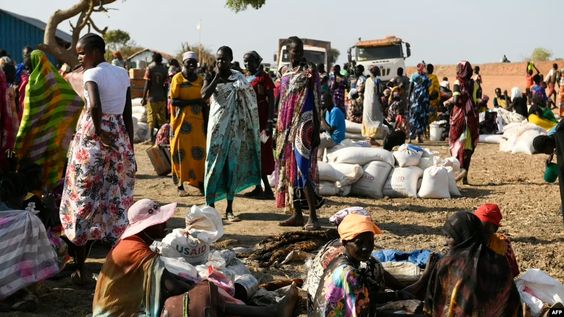Africa
Notwithstanding the dangers, food deliveries are still made in South Sudan

Two drivers for the World Food Program were shot and killed in South Sudan this week, highlighting the fact that it is one of the deadliest countries for relief workers. But, aid workers claim that support is more crucial than ever since, according to the World Bank, over 9 million people will require it this year.
According to Mary Ellan, the national director for the World Food Program in South Sudan, there have been close to 20 attacks on those providing humanitarian food since the beginning of the year. If the attacks are not halted, she warned that there might be a significant loss of life.
For instance, in Jonglei state, nearly 300 tonnes of food were stolen in January of this year. She said, “It would feed 30,000 people for a month.” Their actions are regrettable since the route leading from northern Jonglei to Pibor provides almost 1 million people with food insecurity with a glimmer of hope.
The WFP temporarily stopped food delivery throughout the region as a result of the incident in Jonglei state that claimed the lives of the two drivers.
Aid workers claim they frequently encounter rebels, robbers, and police, and that the roads leading to places in need of assistance are frequently flooded and in poor condition.
several checkpoints
Ellan recounted an ordinary journey:
There are an increasing number of checkpoints. At these checkpoints, our convoys have to spend a lot of time haggling in order to pass. We don’t get paid, yet the hours we spend transporting humanitarian aid are wasted. Levies and taxes do not apply to humanitarian shipments.
Peter Pal is the team leader of the WFP’s Quick Response Mechanism, which sends food aid to rural parts of the nation. He frequently travels vast distances on the roadways from Juba to the most rural areas of the nation to collect information, register those who have been saved, and provide supplies to very remote areas.
“We were performing registration and the water levels [increased] and we have to relocate the services closer to the people for us to accommodate everyone coming to be registered,” said Pal.
We must utilise the canoes, load the generators onto them, and paddle over the marsh to the other side to register them. It’s not going to be simple since we have to go 50 minutes through the swamp in that little boat with all of your gear. He claimed that later it started to rain and that “we need to cover ourselves with a plastic sheet.”
Pal claimed that despite working in such a challenging environment, he finds fulfilment in providing assistance to individuals in need in some of the most distant places.
He declared, “I believe I have the bravery to serve the people. “I am here for a reason; I am in a far better situation than the men and women who are in need. Let the government grant access to all the regions where we provide services to the populace. Let the government support peace as well.
Juma is another employee who has worked in humanitarian relief for five years. He claimed that his greatest joy comes from helping people.
He stated, “I want to have a job where I can directly assist disadvantaged individuals as a result of several things. I have been deeply impacted by events in which other humanitarian workers died while providing relief, but there is nothing I can do and I must continue working.
long swim in the water
Juma, who chose not to use his actual name since he was not permitted to speak to the media, acknowledged that the work also had challenging times.
The unfortunate event, he recalled, “took place in greater Jonglei in 2021.” “To get to the places in September, we had to wade barefoot in the water for 15 hours. That experience still bothers me when I think about it.”
The communications minister for Jonglei state, John Simon Manyuon, described attacks on relief workers as “alarming and of significant worry.” In order to meet civilian, humanitarian, and other demands, he said that the state administration was having trouble providing security “because we don’t have enough soldiers and tanks to be stationed along the routes.”
Before sending out convoys, he asked relief organisations to alert the state government so that it could get ready to provide protection for assistance workers.
